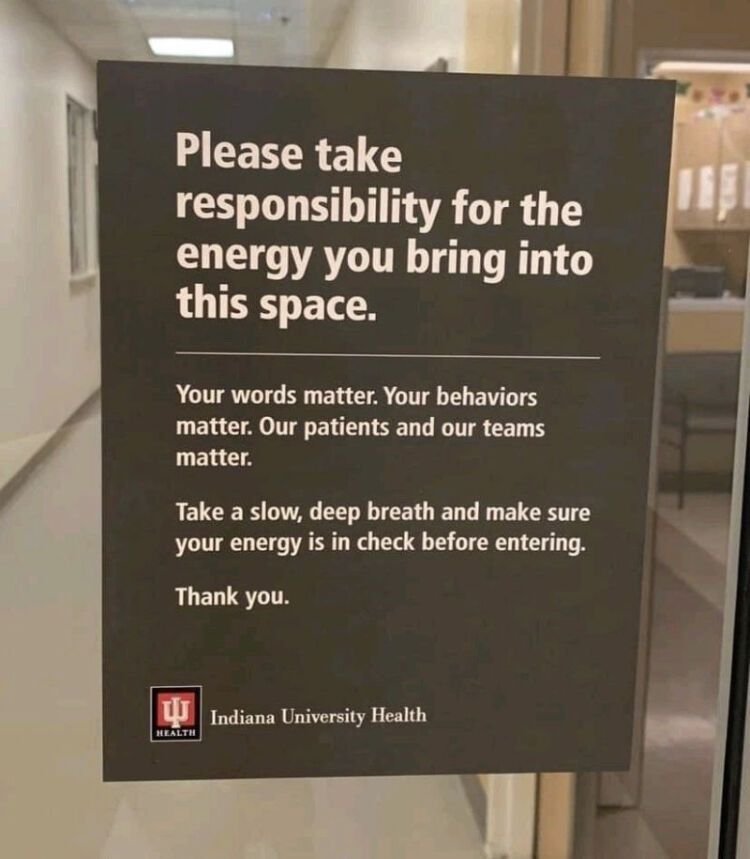How to Manage Emotional Contagion
By now, you may have seen the image going around regarding a sign at an Indiana University Health location. If not, take a look:
Now, if your first thought is "Oh my God, we could use this sign at my company," then you've experienced the negative effects of emotional contagion.
Emotional contagion is how people observe the emotions and behaviors of others and tend to absorb and/or copy those emotions and behaviors. For example, if you're in a pre-meeting conversation and everyone is joking around and in a good mood and then someone walks in with a frown on their face or stress in their voice, the energy in the room changes and not in a good way.
Emotional contagion is shared through someone's posture, facial expressions, vocal tone or volume, or other physical impressions. Think about the last time you were talking to someone and asked them a question and they responded by dropping their head, lowering their vocal volume, and even the tone of their voice seemed to break a bit. In this instance, our smile may turn to a look of concern or sadness ourselves as we are cognizant of the energy across from us.
On the flip side, think about walking into a music venue ready to hear your favorite band. You're surrounded by people who are just as excited and the minute the music comes on, smiles light up, hands go up, and singing and dancing ensues. The positive emotion has spread throughout the room.
This often happens through interactions on social media as well. We may take to social scrolling in a good mood, just looking to kill 5 minutes of time, but when we see one negative comment or post our mood takes an uppercut to the gut.
So how do we manage our own emotions when we may be blindsided by a gust of negativity? Try these negativity counter moves:
Don't take their emotions personally
One of my favorite books of all time is The Four Agreements by Don Miguel Ruiz. One of the main rules is to not take things personally as we are truly only in charge of our emotions and thoughts and not that of others. The person bringing the negative energy has likely experienced something that has nothing to do with you prior to your encounter so what is transpiring is not your doing. As opposed to absorbing the emotion, offer support for whatever they may be facing.
Create a positive atmosphere
We truly are a product of our environment, so how positive is yours? This could make or break your intake of negative contagion. When we have a positive, uplifting environment it helps us stave off the persistence of negativity. Plus, when you're in meetings that bring you down or provide any sort of negative influence, the return to your working space can lift you back if you have the proper setup.
Add some pictures of loved ones and keep a pair of headphones handy so that you can turn on an uplifting song to bring you out of the slide of negative thought. As much as you can, curate your space to be an oasis of happiness. As you can see, I've done the same with my environment as it truly brings me joy (good luck finding a custom Stormtrooper helmet though 🤘🏻)
Activate your self-awareness
Sometimes these negative slides sneak up on us. If you're in back to back meetings and there are some salty individuals in those meetings, you may be shouldering some negative emotions that you don't realize are there.
By activating your self-awareness, you take more control of your emotional status. When I speak on emotional intelligence, I always mention two game changing daily activities that help in these situations:
The Adult Passing Period - We tend to squeeze meetings together as if we're playing some sort of Outlook Tetris. When we don't have time to review what just happened in a meeting, both content and emotion, we just carry everything forward. Start by blocking a minimum of 5 minutes after any meeting to sort out if anything affected you emotionally. By realizing the effect, understanding its effect, and moving on in a more positive frame of mind, you set the rest of the day up for success.
Mid-Day Journaling - As our day goes on, we are absorbing emotion from others and have our own things going on without the influence of anyone else. By taking time around lunchtime to journal, or even just reflection without writing, we can identify when something may have changed our energy or mood. Maybe that 10:30 meeting caught you off guard and sent you down a slippery slope of negativity. To stop and identify what happened, why you reacted the way you did, and how you can turn it around, you start identifying weak spots and vulnerabilities that you can strengthen moving forward.

